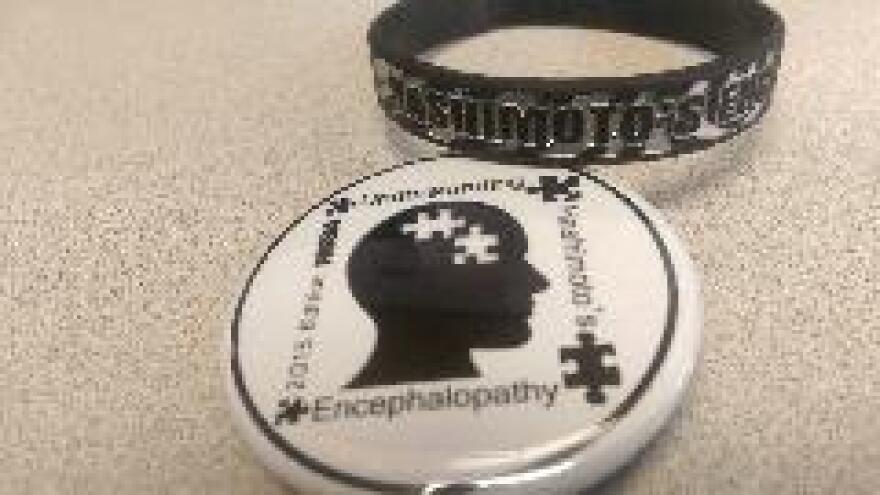“Invisible Illness" is a moniker given to chronic conditions that seriously impair daily living --but have symptoms that are difficult to diagnose. Health advocates report worldwide sufferers number in the tens of millions. KLCC's Tiffany Eckert talks to patients with an invisible illness- who struggle to have their condition recognized and treated.
Kelly McCabe is a 41 year old mother of three.
Kelly: 07 “I suffered from some chronic fatigue and what I thought was cases of shingles since about 2006.”
Kelly worked in childcare with the University of Oregon. In late 2014, she got a headache.
Kelly: “We’re talking like really painful headache like level 7-8 out of 10 pain. So I had to go on short term disability to figure out what was going on with my head.”
Kelly got a referral to a neurologist in Eugene who ordered MRI and an EEG. That showed temporal sharps and slowing in her brain. She was admitted to hospital and administered high dose steroids. Her body’s quick response led to a diagnosis: Hashimoto’s Encephalitis.
There are only a few hundred diagnosed cases of this rare disorder in the United States. Kelly McCabe is one. Beaverton resident Tabitha Orth is another.

Tabitha: “Your brain is on fire. It feels like the soft matter of the brain is on fire. It’s an auto-immune disease and your body attacks your brain.”
Two years ago, Tabitha awoke in the night disoriented and full of anxiety.
Tabitha: “My husband found me. My walking was changing, my gate was changing. My balance, lumbering! I was losing my vocabulary.”
Hashimoto's Encephalitis causes severe brain inflammation and tissue damage. When undiagnosed and untreated, it can lead to coma and death.
Although their symptoms continue to plague them, Kelly and Tabitha consider themselves lucky to at least know what they have.
Tabitha is currently treating her autoimmune encephalitis with IVIG, an antibody infusion therapy she calls "soul food." That treatment hasn’t worked for Kelly. So, her neurologist ordered something different. Plasmapheresis. Kelly explains:
Kelly: “It takes like an hour and a half. And I got hooked up to this machine and they took out my plasma and I literally watched my plasma be taken out of my body and filtered into this bag.”
Then it's all replaced with synthetic plasma.
Kelly says after her first series of plasmapheresis, she felt better-- Almost normal. But one treatment wasn't enough. In late April, her symptoms returned with a vengeance, she sought to have another round. That’s when she hit a wall. Her hospital, PeaceHealth RiverBend Medical Center, was refusing to provide plasmapheresis, citing patient risk.
The day before our interview, Tabitha Orth and scores of supporters joined Kelly and her husband to march on the hospital grounds demanding the ordered treatment.
(sound of crowd demonstration outside hospital)
Two days later, Kelly was rushed to the emergency room. Her potassium levels were dangerously low. She was gravely ill.
When her neurologist arrived, he again ordered plasmapheresis. After a couple days, the hospital nephrology team agreed to administer the plasma replacement procedure. She calls the decision “compassionate.”
Kelly: “With the plasmapheresis, I could go into remission which is my hope for me and my children because I’m not the same person I was.”
Kelly McCabe reports further plasma treatments at PeaceHealth RiverBend remain in question. The hospital won’t comment on individual cases due to patient confidentiality. She still suffers daily from headaches, brain fog, small seizures and fatigue as she and her doctor seek effective, *long-lasting treatment for the brain disorder. Tabitha Orth will continue to undergo 6-hour antibody infusions to treat Hashimoto’s Encephalitis. Both women say they won't stop fighting for themselves and other patients with rare illnesses who struggle to be recognized and helped. Kelly wears a button with a message for everyone.
Kelly: "It says, 'The most powerful thing you can say to a person with an invisible illness is…"I believe you."
Links:
HESA website: http://www.patientresearch.org/pre-order-the-hashimotos-encephalopathy-book/
Review of the book, Fire On The Brain:
http://www.npr.org/2012/11/14/164400198/brain-on-fire-details-an-out-of-mind-experience



